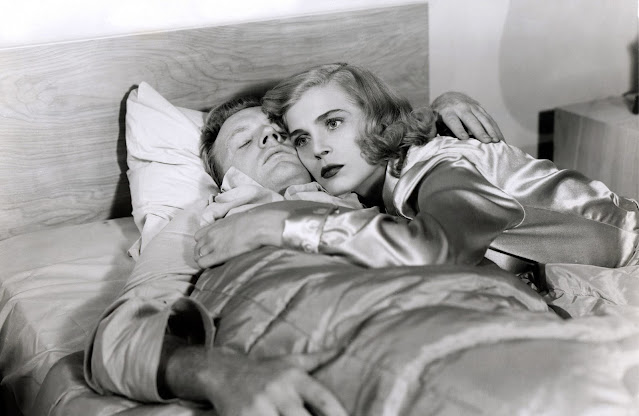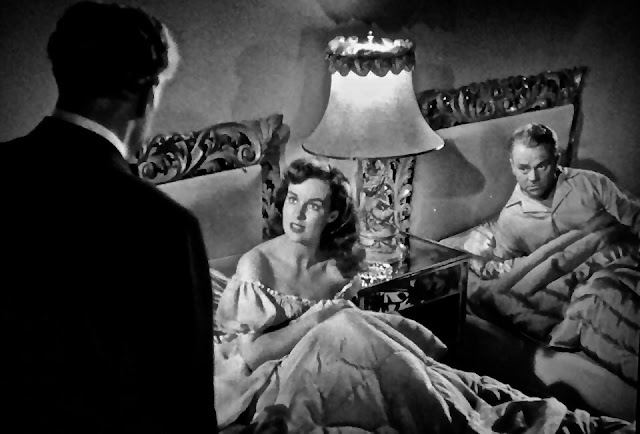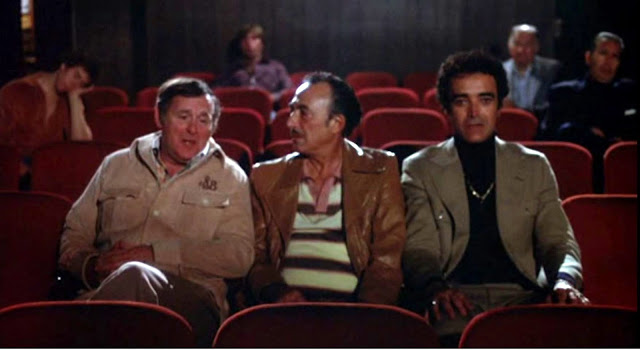May 16th is National Classic Movie Day. As has become tradition, Rick at Classic Film and TV Café is hosting his annual blogathon in honor of the day. This year's theme is "Four Favorite Noirs." Click here and dive deeply into more of those shady dames and tortured guys.
When I learned the topic of this year's National Classic Movie Day blogathon, my heart sank a little. There are so many film folks who are really knowledgeable about Film Noir and I am definitely not one of those people. So if you are, please forgive my limited exposure to the genre. I'm not sure what qualities define a film noir (I always see people asking "is it noir?" so maybe nobody really knows). There seem to be characters who are cold and cruel, yet there are also those who mask a romantic heart with cynicism. Oh, and at least one nutty, improbable thing happens to drive the story forward. Like I said, I'm no expert, but I am game, so here goes:
Too Late for Tears
 |
| Finders keepers, right? |
I like this film because it is a great justification for driving a convertible in California. Not only is the weather great, but a bag of money might just happen to be tossed into your back seat. Hey, you never know!
 |
| Ugh..he's still breathing |
 |
| A rule of film noir: never mess with a seriously messed up dame |
Oh my, James Cagney's Ralph Cotter makes Cody Jarret look like an honorable guy (didn't he always give his gang their fair share?). Cagney can't help but appear sympathetic, but he has a hard time of it here, especially after swatting Barbara Payton with a wet towel (well, she did throw a knife at him first).
This film in no way comes close to "White Heat," but it does have some goodies to make it interesting in a I-can't-stop-watching-this-but-need-to-shower-afterwards kind of way.
First of all, it features the notorious Barbara Payton as some broken doll named Holiday. Initially she seems a little too nice for Cagney. She goes along for the ride with him for quite some time because I guess she has a yen for somewhat charming psychopaths. But - and this may be a film noir rule - never cross a crazy dame. How do we know she's crazy? After Cagney beats her with the aforementioned wet towel, she falls into his arms sobbing "I'm so alone!"
 |
| Cotter knows he's got one crazy dame here |
 |
| Cotter has only one philosophy and it ain't this one |
He marries the heiress and they spend their wedding night in separate beds. Ah, 1950.....
 |
| Movie wedding night 1950 style: not only separate twin beds, but full PJs, too |
As Holiday finally has her fill of Mr. Nasty (his cheating and the fact that he murdered her brother finally push her over the edge), Cagney gets to deliver one more awesome death scene. Nobody died like Cagney.
 |
| A broken champagne bottle is no match for Holiday and her heater. Bye bye Ralph. |
Brighton Rock
 |
| Pinkie and Rose |
The most hateful character by far in my four chosen films is Pinkie Brown, the small time hood with a heart of pure lead. We never learn anything about his background or what makes him tick. He is simply presented to us, a fully grown psychopath. Pinkie is masterfully realized by Richard Attenborough, but this film adaptation of a Graham Greene story (and play) is downright depressing and fascinating at the same time. Maybe this is another rule of noir?
Set in the English seaside town of Brighton in the 1930s, Pinkie runs a brutal crime gang in a town that is crawling with brutal crime gangs. The Brighton Borough Council was so disturbed by the film's depiction of their city that a disclaimer was added to the beginning of the film stating that the gangs as shown in the story no longer existed (which may or may not have been true).
 |
| Pinkie and Rose spend their wedding day by the sea |
Probably the most disturbing part of the story is Pinkie's callous seduction of the innocent Rose. Pinkie's murder victim (a journalist) had a habit of leaving calling cards around places he visited. One such card, which could lead to the discovery of Pinkie's guilt, is found by Rose. In order to stop her from going to the police, Pinkie courts her and marries her.
 |
| Pinkie makes his recording: Rose can't wait to hear it |
And just in case you are lured into believing that Pinkie has feelings for Rose, he makes this recording for her on their wedding day:
"What you want me to say is I love you. Well, here is the truth. I hate you, you little slut. You make me sick."
Shivers. Naturally, Rose doesn't have a gramophone to play the recording. When she can not go through with Pinkie's suicide pact as the law closes in, Pinkie dies while being pursued by the police and she is left only with the recording. Greene's original story ended with her hearing the recording in its entirety and being crushed by the truth. However, the movie's ending was changed in such a way as to preserve Rose's faith and innocence; she plays the recording and it sticks on the words "I love you." Greene hated it.
The Late Show
.JPG) |
| This photo of Martha Vickers is on Ira's bureau. What was she to him? We never learn. It's just a neat noir nod |
Not sure if this film could be called a noir - maybe a neo-noir with a New Age twist? But Art Carney's character certainly lives in a noir world that has passed him by and I just love it.
.png) |
| Ira's partner (Howard Duff) turns up dead and he's on the case. |
Carney is Ira Wells, an old school semi-retired detective with a bad gut whose former partner turns up murdered on his doorstep. Ira's quest to get to the bottom of the murder leads him to Margo Sperling, a New Age kook who wants Ira to find her missing cat. I think Margo, in another decade, would have visited that New Age church in "Kiss Tomorrow Goodbye," but I digress. Through a clever series of events, Margo's missing cat and Ira's dead partner are connected.
 |
| Ira and Margo work the case |
There is a sexy femme fatale and lots of sleazy and quirky characters that fill in the blanks before all questions are answered.
.png) |
| The Femme Fatale |
 |
| The quirky characters |
Margo, played with such spirited joy by Lily Tomlin, begins to care about Ira and reluctantly, Ira starts to warm up to Margo. They are a real odd couple and their developing fondness for one another is at the heart of the film, although the story line is as good as any of the above-mentioned noirs (Robert Benton's screenplay was Oscar nominated). Not to spoil anything, but Margo gets her cat back and she and Ira might be available to crack another case.
.JPG) |
| Might as well take the ride together |





.jpg)








